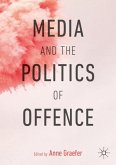This comparative media project attends to the
mediated form cultural objects take on, arguing that
this affects their social and political utility.
Introducing the new theories of la production
feminine and feminine mediature, this book
analyzes the strategic and creative ways that
female-directed media work to create an overlooked
space in-between for feminist politics to
develop. The utility of serial texts, specifically
the covert feminist work they carry out through
mainstream pop culture products, is discussed.
Various narrative forms crossing both media and high-
low cultural divides are interrogated: print
literature, film, and television. Throughout is a
focus on televisual texts, in particular the soap
opera long popular with women. These programs are
used to historicize various postmodern cultural
forms (and the epoch itself), feminist theories of
gender, and the affective shifts of spectatorship,
as well as shifts in textual production, audience
reception, and fandom. The argument is that
television is restructuring how people think and
feel about the world at large and gender relations
in particular.
mediated form cultural objects take on, arguing that
this affects their social and political utility.
Introducing the new theories of la production
feminine and feminine mediature, this book
analyzes the strategic and creative ways that
female-directed media work to create an overlooked
space in-between for feminist politics to
develop. The utility of serial texts, specifically
the covert feminist work they carry out through
mainstream pop culture products, is discussed.
Various narrative forms crossing both media and high-
low cultural divides are interrogated: print
literature, film, and television. Throughout is a
focus on televisual texts, in particular the soap
opera long popular with women. These programs are
used to historicize various postmodern cultural
forms (and the epoch itself), feminist theories of
gender, and the affective shifts of spectatorship,
as well as shifts in textual production, audience
reception, and fandom. The argument is that
television is restructuring how people think and
feel about the world at large and gender relations
in particular.








